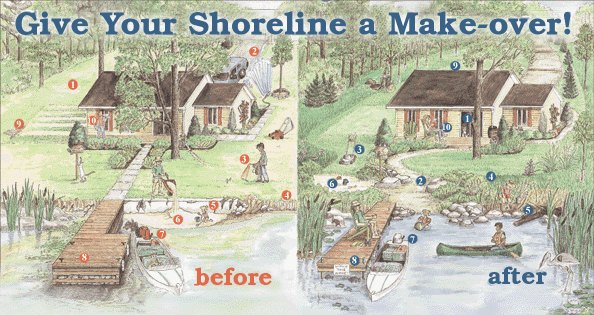Shoreline Modification
Letter from Alberta Environment: Unauthorized Shoreline Modification
Alberta Environment: ShorelineModification.pdf
Approval must also be received by the Council Administration: Development
Below is from www.livingbywater.ca
Letter from Alberta Environment: Unauthorized Shoreline Modification
Alberta Environment: ShorelineModification.pdf
Approval must also be received by the Council Administration: Development
Below is from www.livingbywater.ca

|
Before 1. Cleared, manicured lot - lacks shade and privacy; loss of native plants leads to more erosion, runoff...and work for you! |
After 1. Prune trees rather than removing them; plant low maintenance native trees and shrubs to reduce erosion and absorb runoff. |
|
2. Runoff - flows over solid surfaces accelerating erosion; pollutants and excess silt degrade habitat for aquatic life. |
2. Replace solid surfaces with porous materials where possible; redirect runoff into settling areas, away from the water's edge. |
|
3. Chemical fertilizers and pesticides - degrade water quality, are hazardous to your health, can be deadly for fish and other wildlife. |
3. "Mow it high and let it lie" - leave grass 8 cm (3") high to retain moisture, mulch clippings for fertilizer. |
|
4. Lawn to the water's edge - lacks deep roots required to stabilize bank. |
4. Start a buffer - leave some grass uncut along the water's edge; restore with deep rooting native plants. |
|
5. Hardened shoreline - can deflect erosion downstream, eliminates "natural filtering" of pollutants and sediment, degrades habitat. |
5. "Soften" your shoreline - improve erosion protection with native trees, shrubs, grasses and aquatic plants. |
|
6. Artificial beach - requires ongoing sand replacement, reduces water quality, degrades aquatic habitat. |
6. Create a "dry land" beach above the high water mark; let imported sand erode away naturally and native plants grow back. |
|
7. Old 2-stroke engine - dumps 25-40% of fuel, un-combusted into water and air. |
7. Use a well maintained electric motor, or a 4 or 2-stroke engine that meets or exceeds EPA 2006 guidelines. |
|
8. Solid crib dock - destroys acquatic habitat, alters currents, can deflect erosion downstream. |
8. Remove solid dock - try a pipe, cantilever or floating dock, avoid treated wood; use public access where possible. |
|
9. Malfunctioning septic system - allows phosphorous and bacteria to leach into adjacent waterways. |
9. Replace and properly maintain your septic system - consult an expert. |
|
10. Harmful household chemicals and cleaners - damage septic system and degrade water quality. |
10. Use environment - friendly products, or alternatives like baking soda and vinegar. |
